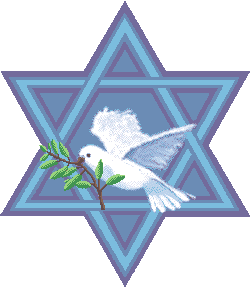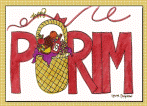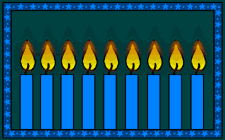Biblical Feasts
Machol Dance Ministries
(Festival Overview)

Understanding
The Jewish
Calendar
Festival
Calendar
Church
History
Festival Basics
Shabbat
Spring Festivals
Pesach
Unleavened Bread
First Fruits
Shavuot
Fall
Festivals
Yom Teruah
Yom Kippur
Sukkot
Minor
Festivals
Purim
Hanukkah
Purposes of
the
Festivals
Why
Christians Should
Observe the
Festivals
Festival Overview
Most of the western world today uses the Gregorian calendar (a solar calendar) that was established by Pope Gregory VIII in 1582.
Unlike the Gregorian calendar, the Jewish calendar is a lunar calendar which also uses solar movements. The months are determined by the moon, but the year is determined by the sun. The Jewish day begins at sunset.
There are 12 months in the Jewish calendar - each with alternating 29 or 30 days. A leap year occurs in the Jewish calendar about every two to three years - adding an extra month. This extra month adjustment is necessary to ensure that the major festivals stay in their correct seasons.
The names of the months and the process of establishing the calendar has changed over the years. Following the Babylonian exile in 586 - 515 BCE, the Jewish calendar reflected the Babylonian names of the months and those names still exist today in the current Jewish calendar. The twelve regular months in the calendar are Nisan (30 days), Iyar (29 days), Sivan (30 days), Tamuz (29 days), Av (30 days), Elul (29 days), Tishri (30 days), Cheshvan (29 days), Kislev (30 days), Tevet (29 days), Shevat (30 days) and Adar (29 days). Each Jewish month starts at the New Moon.
The Jewish week is composed of a seven-day cycle, mirroring the seven-day period of the Book of Genesis in which the world was created. The names for the days of the week, like those in the Creation story, are simply the "day number" ("Yom Rishon" or the "1st Day") within the week, with Shabbat being the seventh day.
The Jewish day always runs from sunset to the next sunset. In the leap year (such as 5771) an additional month, Adar I (30 days) is added after Shevat and the regular Adar is referred to as "Adar II".
Today the Jewish calendar is determined by precise astronomical calculations, but that wasn't always the case. For centuries the beginning of each month was determined by the sighting of the new moon (Numbers 10:10; Psalm 81:3).
Today the new moon is called "Rosh Chodesh" (Head of the Month) and is marked in the synagogue with prayers, Torah readings, and special greetings.
In Exodus 12, God established the order of the months. This was the first Jewish calendar used to determine the holidays. Nisan (called Abib in the Bible) was to be the first month and mark the redemption of Israel from Egypt. Pesach/Passover is celebrated in the month of Nisan on Nisan 15, corresponding to the full moon. Pesach is a Spring Festival associated with the barley harvest, so the leap-month mentioned above is intercalated periodically to keep this festival in the northern hemisphere's spring season.
By Yeshua/Jesus' time, there was a second calendar used for civil affairs. This calendar began with the month of Tishri. This second calendar follows the plan described in the Mishnah and is still in use today. Rosh Hashanah (which means "the head of the year") occurs on Yom Teruah and is celebrated in the month of Tishri on Tishri 1. This is when the numbered year changes.
To determine the Jewish calendar year, simply add 3761 to the western calendar year. The Jewish year 5772 begins on September 29 of the Gregorian year 2011.Biblical references to the pre-Jewish calendar include ten months identified by number rather than by name. In parts of the Torah portion "Noach/Noah" (specifically Gen 7:11, Gen 8:4-5, Gen 8:13-14), it is implied that the months are thirty days long. There is also indication that there were twelve months in the annual cycle (1 Kings 4:7, 1 Chronicles 27:1-15).
Prior to the Babylonian exile, the names of only four months are referred to in the Tanach:
* Aviv - the 1st month - literally "spring", which originally probably meant "the ripening of barley" (Exodus 12:2, 13:4, 23:15, 34:18, Deut 16:1)
* Ziv - the 2nd month - literally "light" (1 Kings 6:1, 6:37)
* Ethanim - the 7th month - literally "strong" in plural, perhaps referring to strong rains (1 Kings 8:2).
* Bul - the 8th month (1 Kimgs 6:38).
All of these are believed to be Canaanit names and at least two are Phoenician (Northern Canaanite).
During the Babylonial exile, which started in 586 BCE, Babylonian names were adopted, which are still in use.For several centuries, many Karaite Jews, especially those outside Israel, followed the calculated Rabbinic calendar, because it was not possible during the exile to retrieve accurate new moon sightings, and "Aviv barley" data from the land of Israel, which had to be relayed to the entire Karaite Jewish community. However, since the establishment of the State of Israel, and especially since the Six Days War, most Karaite Jews have made aliyah and can now again use the observational calendar.
Karaites use the lunar month and the solar year, but the Karaite calendar differs from the Rabbinic calendar in a number of ways.
For Karaites, the beginning of each month, the Rosh Chodesh, can be calculated, but is confirmed by the observation in Israel of the first sighting of the new moon. This may result in an occasional variation of a maximum of one day, depending on the inability to observe the new moon. The day is usually "picked up" in the next month.
The addition of the leap month (Adar II) is determined by observing in Israel the ripening of barley (called "Aviv"), rather than using the calculated and fixed calendar of Rabbinic Judaism. Occasionally this results in Karaites being one month ahead of other Jews using the calculated Rabbinic calendar. The "lost" month would be "picked up" in the next cycle when Karaites would observe a leap month while other Jews would not.
Furthermore, the seasonal drift of the Rabbinic calendar is avoided, resulting in the years affected by the drift starting one month earlier in the Karaite calendar. Also the four rules of postponement of the Rabbinic calendar are not applied, as they are not found in the Tanakh. THis affects the dates observed for all the Jewish holidays by one day.
Gregorian Year 2018 2019 2020 2021 2022 JEWISH YEAR 5778 5779 5780 5781 5782 MINOR FEASTS 2018 2019 2020 2021 2022 Purim
(Feast of Lots)March 1 March 21 March 10 Feb 26 March 17 MAJOR FEASTS [Starts at Sundown the Previous Day] Pesach -פסח
(Passover)March 31 April 20 April 9 March 28 April 16 Hag HaMatzot
(Unleavened Bread)April 1 April 21 April 10 March 29 April 17 Yom HaBikkurim
(First Fruits)April 2 April 22 April 11 March 30 April 18 Shavuot - שבועות
(Weeks - Pentecost)May 20 June 9 May 29 May 17 June 5 JEWISH YEAR 5779 5780 5781 5782 5783 Yom Teruah
(Day of the Awakening Blast)Sept 10 Sept 30 Sept 19 Sept 7 Sept 26 Yom Kippur - יום כפור
(Day of Atonement)Sept 19 Oct 9 Sept 28 Sept 16 Oct 5 Sukkot - סוכות
(Feast of Booths)Sept 24 Oct 14 Oct 3 Sept 21 Oct 10 Simchat Torah
(Rejoicing in the Torah)Oct 2 Oct 22 Oct 11 Sept 29 Oct 18 MINOR FEASTS 2018 2019 2020 2021 2022 Chanukkah - חנוכה
(Feast of Lights)Dec 3 Dec 23 Dec 11 Nov 29 Dec 19 For much of my early Christian walk I was unaware of the Festivals of the Lord that are mentioned in Leviticus 23. They are mentioned in Old and New Testament scripture, but for 30 years of my life I never heard a pastor mention one of them. Why is this? When Constantine became emperor of Rome in 300 C.E., he made Christianity the national religion of the state. To some, this might look like a good thing, but let’s look at it a little closer. Constantine removed anything from the church that looked Jewish. He merged pagan symbols and practices into the official state religion (sun and cross) and Sabbath was changed from Saturday to Sunday. Pesach was no longer observed, and Easter was substituted in its place. Christmas was celebrated instead of Hanukkah.
Mark 7
8 For laying aside the commandment of God, ye hold the tradition of men...
9 Full well ye reject the commandment of God, that ye may keep your own tradition.
Many Christians see Christianity as "the religion of love" and Judaism as "the religion of law," but looking at Constantine's actions against the Jews could well bring this into question.
Within a short time, Jews living in the Empire had lost most of their civil rights. For a Jew to marry a Christian was an offense punishable by death. The Jewish Supreme Court, the Sanhedrin, was forbidden to meet, and sermons against the Jews, often inciting violence, were routinely preached. The idea of presenting Jews as the killers of Jesus originated at this time, though it was not popularized until several hundred years later.
For many years, much of the church believed in Replacement Theology – that the church had replaced Israel. There was no state of Israel, so this had to be true. This all changed in 1948 when the State of Israel was reborn from the ashes of World War II.
In 1967, Israel finally took control of the city of Jerusalem. Look at what Yeshua had to say about this.
Luke 21
24 Jerusalem shall be trodden down of the Gentiles, until the times of the Gentiles be fulfilled.
27 And then shall they see the Son of man coming in a cloud with power and great glory.
28 And when these things begin to come to pass, then look up, and lift up your heads; for your redemption draweth nigh.
32 Verily I say unto you, This generation shall not pass away, till all be fulfilled.
I must tell you, when I read this in Don Finto’s book, Your People Shall Be My People in 2002, I actually wept. It’s as clear as the nose on your face. Yeshua is coming in this generation!
Yeshua is coming back for a bride that is without spot or blemish. Will she look like the traditional church of the past, or will she look more like a young Jewish virgin? God is restoring many things to believers that had been lost to them through Constantine and other early church fathers. As the time approaches, God is making us more aware of the Hebrew roots of our faith.Leviticus 23
2 Speak unto the children of Israel, and say unto them, concerning the Feasts of the Lord, which ye shall proclaim to be holy convocations, even these are my feasts.
The first thing we notice is that they're God's feasts, not the Jew's feasts.
The word "feast" is the Hebrew word "moed" meaning "set time" or "appointment."
Convocation is the Hebrew word "miqra" meaning a rehearsal. The festivals all point to Yeshua. All festivals either have been, or will be, fulfilled in Yeshua.
Shabbat is first and foremost of all the Festivals of the Lord. It's so important that God commanded that it be observed each week.
Exodus 20
8 Remember the Sabbath day, to keep it holy.
11 The LORD blessed the Sabbath day, and hallowed it.
Exodus 32
16 Wherefore the children of Israel shall keep the Sabbath, to observe the Sabbath throughout their generations, for a perpetual covenant.There are three Pilgrim Festivals … Pesach, Shavuot and Sukkot. Each year, the Jews were required to make a pilgrimage to Jerusalem to worship the Lord in the temple there.
There are four festivals that appear in the spring of each year - Pesach (Passover), Hag HaMatzot (Unleavened Bread), Hag HaBikkurim (Firstfruits) and Shavuot (Weeks or Pentecost).Hag HaPesach - The Feast of Passover
Pesach (Passover) - Nisan 14
Leviticus 23
5 In the fourteenth day of the first month at even is the LORD's Passover.
Yeshua and his disciples observed Pesach.
Matthew 26
17 Now the first day of the Feast of Unleavened Bread the disciples came to Jesus, saying unto him, where wilt thou that we prepare for thee to eat the Passover?
18 And He said, Go into the city to such a man, and say unto him, The Master saith, My time is at hand : I will keep the Passover at thy house with my disciples
Yeshua died on Pesach (Passover).
Pesach/Passover
1. Commemorates God’s deliverance of the Jews from Egypt by the hand of Moses.
2. Commemorates God’s deliverance of all mankind from sin by the hand/death of Yeshua.
3. A Pesach Seder meal is observed. A Haggadah is used to tell the original covenant story as well as the Brit Hadasha parallels of Yeshua.
4. The Seder table contains haroset the shank-bone from a lamb, salt water, bitter herbs, a roasted egg, parsley, matzah (unleavened bread) and 4 cups of wine.
5. Pesach is the 14th of Nisan. This is when the lamb would have been sacrificed.
6. Yeshua died on Pesach, was buried on Unleavened Bread, and rose from the dead on First Fruits.
Hag HaMatzot - The Feast of Unleavened Bread
Unleavened Bread - Nisan 15
Leviticus 23
6 And on the fifteenth day of the same month is the feast of Unleavened bread unto the LORD; seven days ye must eat unleavened bread.
Yeshua was buried on the Feast of Unleavened Bread.
Hag HaMatzot/Unleavened Bread
1. Unleavened Bread begins on the 15th of Nisan (March/April) and lasts for 7 days.
2. On the Feast of Chag HaMotzi/Unleavened Bread, only matzah is eaten.
3. Leaven represents sin, thus all leaven has been removed from the home.Hag HaBikkurim - The Feast of Firstfruits
Firstfruits - Nisan 16
Leviticus 23
10 Ye shall bring a sheaf of the firstfuits of your harvest unto the priest.
11 And he shall wave the sheaf before the LORD, to be accepted for you
14 It shall be a statute for ever throughout your generations
Yeshua resurrected on the Feast of Firstfruits.
Hag HaBikkurim/Firstfruits
1. First Fruits is celebrated on 16th of Nisan.The firstfruits of the barley harvest were brought to the temple on the Feast of Firstfruits and offered to the Lord. Hag HaShavuot - The Feast of Weeks (Pentecost)
Shavuot (Pentecost) - Sivan 6
Leviticus 23
15 And ye shall count unto you from the morrow after the Sabbath, from the day that ye brought the sheaf of the wave offering; seven Sabbaths shall be complete;
16 Even unto the morrow after the seventh Sabbath shall ye number fifty days.
21 It shall be a statute for ever throughout your generations
The Law / Torah was given on Shavuot.
The Church was born on Shavuot.
Shavuot is also called the Feast of Weeks and the Feast of Harvest.Shavuot/Weeks/Pentecost
1. Commemorates Adonai's giving Torah on Mt. Sinai.
2. Commemorates Adonai giving the Ruach Ha Kodesh/Holy Sprit after Yeshua's resurrection from the dead.
3. Frequently referred to as the birth of the Church.
4. Original covenant Shavuot, 3000 were slain. In the Brit Hadasha Shavuot, 3000 were saved.
5. Shavuot is observed for two days in May or June, Sivan on the Jewish calendar.
6. Jews frequently stay up all night reading & studying Torah.
7. The Book of Ruth is read.
8. It’s customary to eat dairy foods on Shavuot … remembering God’s promise for a land flowing with “milk & honey”.
There are three festivals that appear in the fall ... Rosh Hashanah (Feast of Trumpets), Yom Kippur (Day of Atonement) and Sukkot (Feast of Tabernacles). Like the spring feasts, these are prophetic but have yet to be fulfilled in Messiah Yeshua.
Yom Teruah - Day of the Awakening Blast
Yom Teruah (Day of the Awakening Blast) also called Rosh Hashanah (Feast of Trumpets) - Tishrei 1
Leviticus 23
24 Speak unto the children of Israel, saying, In the seventh month, in the first day of the month, shall ye have a Sabbath, a memorial of blowing of trumpets, an holy convocation.
The catching away of the Bride of Messiah (Rapture) will occur on Yom Teruah.
Also called The Head of the Year, Day of the Loud Shout, Day of the Awakening Blast, That Day, Day of Remembrance (Yom ha Zikkaron), Day of Judgment (Yom Hadin), Day of the King (Yom ha Melech), Day of the Hidden Moon (refers to the chupa and marriage of Messiah & His bride), Day of the Sounding of the Shofar, Feast of the Last Trump, Feast of the Born Again; Days of Awe, Jewish New Year.
There are some phrases that refer to Rosh Hashanah when you see them in scripture, such as...
...the court was seated
...the books were openedYom Teruah/Day of the Awakening Blast/Feast of Trumpets
1. Celebrated by the sounding of the shofar - and is a time for repentance.
2. Yet to be fulfilled by Yeshua.
3. Is also the Jewish New Year
4. Points toward the Coronation of the King, the Resurrection of the Dead, as well as the “catching-away” of Believers
5. Teshuvah, a time of repentance” begins 30-days before Rosh Hashanah on Elul 1.
6. Yom Teruah is observed for 2-days on Tishri 1 & 2, September/October. The 2-day celebration counts as ONE long day. “No one knows the day or the hour”.
7. Tashlich, the casting of stones or bread into a body of water, is frequently observed by Jews and Believers.
8. Also called Rosh Hashanah (Head of the Year)Yom Kippur - Day of Atonement
Yom Kippur (Day of Atonement) - Tishrei 10
Leviticus 23
27 Also on the tenth day of this seventh month there shall be a Day of Atonement
Yom Kippur refers to God's judgment of the earth.
Yom Kuppur is also called the Day of Covering.Yom Kippur/Day of Atonement
1. The most solemn day on the Jewish calendar
2. Observed for one day, on Tishri 10, September/October….usually with a 25-hour fast.
3. One goat was sacrificed in the temple for the sins of Israel, and the other (the “scapegoat”) was led away into the wilderness and pushed over a cliff.
4. Yeshua became the “Ultimate” Atonement - not just covering our sins, but totally removing them.
5. Yeshua will physically return on Yom Kippur to judge the Earth.
6. Kol Nidre is the evening service that starts Yom Kippur.
7. Kol Nidre means “all vows” and is a time when God is petitioned to forgive the vows, oaths and promises we have not fulfilled.
8. It's customary to wear white on Yom Kippur.Hag HaSukkot - The Feast of Booths
Sukkot (Feast of Tabernacles) - Tishrei 15
Leviticus 23
34 The fifteenth day of this seventh month shall be the feast of tabernacles for seven days unto the LORD.
42 Ye shall dwell in booths seven days. These would be combined for the third pilgrimage.
Messiah Yeshua will Tabernacle with us for His 1000 year reign.
Sukkot is also called the Feast of Ingathering, The Feast, The Feast of Booths, Feast of Full Glory, Feast of the Watergate, Season of Our Joy and Festival of the Final Harvest.Sukkot/Booths/Feast of Tabernacles
1. Celebrated by living in “booths” called sukkas.
2. Observed for 7 days, beginning with Tishri 15, September/October.
3. The 4 species are waved each of the 7 days – North, South, East, West, Up, Down.
4. The 4 species are the Etrog (the Citron), Lulav (Palm Branch), Hadas (Myrtle), and Aravah (Willow).
5. Shemini Atzeret, which occurs on the 8th day, is a separate festival, but is associated with Sukkot.
6. In ancient times, the Water Libation ceremony was a time when prayers would be offered to God concerning rain for the new year.
7. Sukkot is a time of year when the seasonal rains come.
8. The 9th day is called Simchat Torah, or “Rejoicing in the Torah”.
9. Sukkot will be observed during the Millennium reign of Yeshua, and is symbolic of the thousand-years we’ll enjoy with Him.There are two minor festivals that are not mentioned in Leviticus 23. These feasts are Purim and Hanukkah.
Purim - The Feast of Lots
Purim (Feast of Esther) - Adar 14th & 15
Esther 9
21 They should keep the fourteenth day of the month of Adar, and the fifteenth day of the same, yearly.
Purim is the story of Queen Esther and how God saved the Jews from destruction at the hand of Haman.Purim/Lots
1. Commemorates God’s deliverance of the Jews from the hand of the evil Haman.
2. Esther marries King Ahashuerus - “for such a time as this.”
3. The Megilla/scroll/book of Esther is traditionally read, or a play performed during the feast.
4. Costumes are worn, reminding us that Esther, too, was hidden in the King’s chambers until needed.
5. Hamantasen, a 3-sided pastry, is eaten. Reminds us of Haman’s hat or pocket.
6. Gifts of food and clothing are given to the needy.
7. Groggers, “boo-ing”, and “hiss-ing” are used to drown out Haman’s name.
8. The day before Purim is the Fast of Esther.
9. Purim is a 2-day festival that occurs in February/March…or Adar 14th and 15th.
Chanukkah - The Feast of Lights
Chanukkah (Feast of Dedication) - Kislev 25
John 10
22 And it was at Jerusalem the Feast of Dedication, and it was winter.
Hanukkah is the story of the Macabees and how God once again saved his chosen people from destruction, this time at the hands of King Antiochus of Syria. "A Great Miracle Happened There!"Chanukkah/Dedication/Lights
1. Yeshua celebrated Hanukkah.
2. The feast is also called the Feast of Dedication and is considered one of the "minor" festivals not listed in Leviticus 23.
3. Commemorates God’s deliverance of the Jews by the hands of Antiochus & Judas Maccabees who overthrew Antiochus Epiphanes and the Assyrian rule in Israel
4. The festival remembers the restoration and cleansing of the temple in Jerusalem.
5. Miracle of the Oil – only enough kosher oil to last for one day, but miraculously lasted 8 days until more could be obtained.
6. To commemorate the holiday, Jews burn a nine branched candelabrum called a Hanukkiah.
a. One additional candle is lit for each night until the 8th night.
b. The “Helper” candle is called the “Shamash”.
7. Fried foods are also eaten as a reminder of the miracle of the oil: potato latkes, donuts.
8. Some celebrate by performing a Hanukkah play.
9. Hanukkah is celebrated for eight days in November/December - beginning Kislev 25th on the Jewish calendar.
There were 5 main purposes for celebrating the Feasts of the Lord:
1. To unify the Nations
2. An opportunity to worship God
3. They illustrate spiritual truths
4. They foretell the Messiah
5. Remembrance1. They're Perpetual Exodus 31:16 Wherefore the children of Israel shall keep the Sabbath to observe the Sabbath throughout their generation, for a perpetual covenant.
A. It doesn't matter what others thinks about it - what does God think about the Festivals?
Leviticus 23: 2 Speak unto the children of Israel, and say unto them, concerning the Feasts of the Lord, which ye shall proclaim to be holy convocations, even these are my feasts.2. They Honor the Lord Isaiah 58:13 If thou turn away thy foot from the Sabbath, from doing thy pleasure on my holy day; and call the Sabbath a delight, the holy of the LORD, honourable; and shalt honour Him, not doing thine own ways, nor finding thine own pleasure, nor speaking thine won words: 14 Then shalt thou delight thyself in the LORD; and I will cause thee to ride upon the high places of the earth, and feed thee with the heritage of Jacob thy father: for the mouth of the LORD has spoken it. 3. The Early Church Kept the Festivals Acts 18:20-21 When they desired him (Paul) to tarry longer time with them, he consented not; But bade them farewell, saying, I must by all means keep this feast that cometh in Jerusalem: but I will return again unto you, if God will. And he sailed for Ephesus.
Acts 27:9 Much time had been lost, and sailing had already become dangerous because by now it was after the Fast (Refers to the Fast of Yom Kippur/Day of Atonement)4. Yeshua/Jesus Kept the Festivals
PESACH/Passover
Luke 2:41-42 Every year his parents went to Jerusalem for the Feast of Passover. When he was twelve years old, they went up to the Feast, according to the custom.
Matthew 26:17-18 On the first day of the Feast of Unleavened Bread, the disciples came to Jesus and asked, "Where do you want us to make preparations for you to eat the Passover?" He replied, "Go into the city to a certain man and tell him, 'The Teacher says: My appointed time is near, I am going to celebrate the Passover with my disciples at your house.'"
Mark 14:14-15 Say to the owner of the hosue he enters, "The Teacher asks: 'Where id my guest room, where I may eat the Passover with my disciples?' He will show you a large upper room, furnished and read. Make preparations for us there."
Luke 22:7-8 Then came the day of Unleavened Bread on which the Passover lamb had to be sacrificed. Jesus sent Peter and John, saying, "Go and make preparations for us to eat the Passover."
John 2:23 Now while he (Jesus/Yeshua) was in Jerusalem at the Passover Feast, many people saw the miraculous signs he was doing and believed in His name.
John 5:1 After this there was a Feast of the Jews; and Jesus went up to Jerusalem.
Sukkot/Tabernacles
John 7:2 Now the Jews' Feast of Tabernacles was at hand. 11 Then the Jews sought Him at the feast, and said, Where is He? 14 Now about the midst of the feast Jesus went up into the temple and taught. 37 In the last day, that great day of the feast, Jesus stood and cried, saying, "If any man thirst, let him come unto me and drink. 38 He that believeth on me, as the scripture hath said, out of his belly shall flow rivers of living water (referring to the Water Libation Ceremony at SUKKOT)
Chanukah/Dedication/Lights
John 10:22-23 Then came the Feast of Dedication at Jerusalem. It was winter, and Jesus was in the temple area walking in Solomon's Colonnade.
Mark 7:8 You have let go of the commands of God and are holding on to the traditions of men."5. It Offers a Weekly Foretaste of the Era of Rest When Messiah Will Rule on the Earth Zechariah 14:9 And the Lord shall be king over all the earth; in that day shall there be one Lord, and his name one. 16 And it shall come to pass, that every one that is left of all the nations which came against Jerusalem shall even go up from year to year to worship the King, the Lord of hosts, and to keep the Feast of Tabernacles. 6. It is a Joy 7. It Draws Families Together If you're interested in learning more about the Festivals of the Lord, their symbolism and how to observe them, follow the links at the top of the page.













